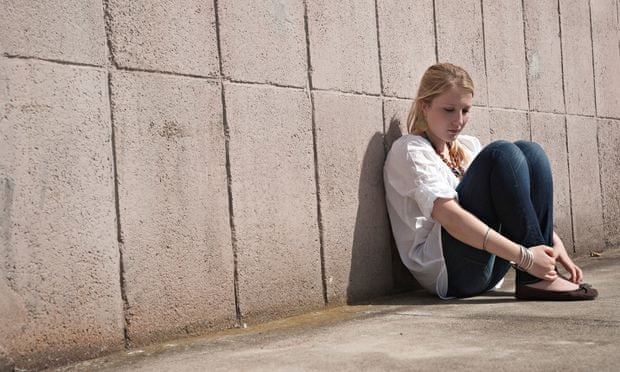The myth of the ‘extreme male brain’ means women with autism are struggling to get the help they need

Women with autism are often vulnerable to abuse. Photograph: Alamy
Rachel Williams Tuesday 6 January 2015
In her early 20s, Mina saw three GPs as she tried to get an assessment for Asperger syndrome (AS), a form of autism she’d suspected she had since she was 11. All refused to give her the referral she needed. Instead, one passed her to the local mental health team for an eating disorder she didn’t have while another said she couldn’t have AS because she had a boyfriend.
“He had to look in a book to check what Asperger syndrome was, and, after glancing down at the page of traits, decided that I was just a nervous person who was afraid of doctors,” she remembers.
Three years after first seeking an assessment, Mina, now 24, finally got an official diagnosis. Had her AS been recognised in childhood, during the “utter hell” of school and constant bullying, life might have been very different, she thinks.
“I wouldn’t have gone through so much pain and confusion and may not have gone on to develop depression and anxiety. I would have learned that I was missing out on all the unwritten rules, and been able to learn them to keep myself safe.”
Autism, characterised in the past as a result of an “extreme male brain”, is far more prevalent in women than previously thought but is still often untreated because the stereotype focuses on male behaviour; women, it is commonly believed, mask their symptoms by learning to imitate the behaviour of non-autistic people. But without a diagnosis, experts say, their difficulties with social interaction and attachment to routine are misunderstood at school and then work, leaving them at increased risk of mental health problems including depression, eating disorders and self harm. Often naive and fearful of displeasing people, autistic women are also vulnerable to abuse.
And yet a recently published draft of new guidance, designed to improve the care and support NHS organisations and local authorities give to adults with autism, made no mention of women’s differing needs.
“I was absolutely shocked that women weren’t included in the guidance,” says Monique Blakemore, of user-led advocacy and campaigning group Autism Women Matter (AWM). “I was asked last year by the Department of Health (DH) to feed back on the key issues for women. We did a survey of around 100 women and presented the results to the DH. We engaged in the process but we just don’t feel it has engaged enough with us.” Leading charity the National Autistic Society(NAS) has also highlighted the omission, in order that the guidance be revised to specifically address women’s needs.
Blakemore, the mother of two autistic children, founded AWM in November 2013 with fellow campaigner Olley Edwards. “The response we had was overwhelming,” she says. “There were hundreds and hundreds of women getting in touch.”
The struggle to get a diagnosis came up again and again. If a GP refuses to refer someone for assessment, the only option is to go private, at a cost of between £300 and £1,500. Among the 62% of women in AWM’s survey who had been formally diagnosed, almost a third (29%) had done just that.
Social workers misinterpreting the actions of autistic mothers with autistic children was another problem. Women upset by disruption to family routine caused by a professional, for example, might mistakenly be perceived as being obstructive, says Blakemore. That can be disastrous in a system where cooperation with social services is crucial.
At the NAS’s Lorna Wing Centre for Autism, director Dr Judith Gould says she sees women in their 30s, 40s and even older, who have never had a diagnosis. The majority have been in abusive relationships.
Traditionally, autism is estimated to be four or five times more common in males than females; Gould, a consultant clinical psychologist, is reluctant to put a figure on what that ratio may realistically be, and simply says there are “far more girls than has ever been thought”. The centre gets calls from two or three women, or parents ringing about daughters, every week. But if a GP isn’t supportive, “you’re stuck,” she says. Gould is now reworking the questions asked of female patients in one of the main diagnostic tools, DISCO (Diagnostic Interview for Social and Communication Disorders), used in the UK by doctors.
AWM wants to see gender specific autism training for professionals – including social services, the justice system and GPs. A DH spokesperson said of their comments on the guidelines: “We welcome the views made and that is exactly why we have consulted on this draft guidance.”
Claire Burke was only diagnosed with Asperger’s at the age of 36. Throughout her childhood and adolescence, her mother had been brushed off by health professionals as she repeatedly sought an explanation for her daughter’s behaviour – which included repetitive twirling and, when young, refusing to eat anything but dry chicken, bacon and eggs cut into star shapes.
In her late 20s, she was misdiagnosed with depression and OCD, while her real condition caused havoc in her personal and professional life. At work, she would have “meltdowns” if asked to do something outside her usual remit. “I would be shouting at my boss, yelling at the top of my voice, throwing things,” she remembers. “I didn’t know what was going on. It was horrendous.”
Burke, now 41, is angry about the time her diagnosis took. “When a woman presents, it’s an enigma to them,” she says. “If I’d got my diagnosis when I was a child, maybe they could have put coping mechanisms in place.
“It’s sad, because even now there must be lots of girls undiagnosed and going into adulthood with this. That’s a sorry state of affairs.”
from http://www.theguardian.com/lifeandstyle/2015/jan/05/are-women-with-autism-being-failed-by-nhs